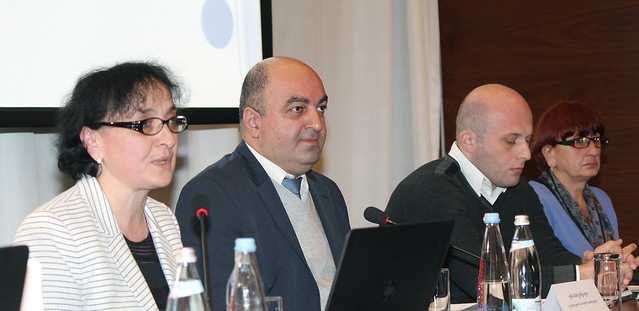Rights Situation of Persons with Disabilities in State Care Institutions
On October 20, 2016, the Public Defender of Georgia presented a report on the monitoring of state care institutions of persons with disabilities to state agencies and non-governmental organizations.
The monitoring was carried out within two important mandates of the Public Defender - the National Preventive Mechanism and the monitoring mechanism for the implementation of the UN Convention on the Rights of Persons with Disabilities.
The monitoring was conducted in five residential institutions: Tbilisi infant house (58 beneficiaries were in the facility at the time of the monitoring); Kojori house for children with disabilities (28 beneficiaries); Dzevri boarding house for persons with disabilities (64 beneficiaries); Dusheti boarding house for persons with disabilities (43 beneficiaries); Martkhopi boarding house for persons with disabilities (69 beneficiaries).
Representatives of the Public Defender’s Office checked the rights situation of persons with disabilities in the abovementioned institutions and compliance of the institutions with the standards of the UN Convention on the Rights of Persons with Disabilities, other international instruments and national legislation.
The monitoring showed that institutional arrangement of the daily specialized institutions for persons with disabilities, non-adapted infrastructure, lack of professional and assistant staff, lack of psycho-social services and relevant professional personnel, problems in contact with the outside world and families (including children), social passivity and isolation from the society, as well as shortcomings related to the administration of the institutions and challenges related to medical service, impede delivery of individual needs-based services to persons with disabilities, which leads to blatant violation of the beneficiaries’ rights, including discriminatory treatment, and sometimes violation of the disabled persons’ right to life. In addition, the level of knowledge of violence-related legal regulations and standards is extremely low among service providers; care for safety of the beneficiaries, as well as for their emotional, psychological well-being and mental health, is poor.
Beneficiaries are not aware of their rights. The administration of the institutions does not regard the abovementioned issues as an important standard of care.
In connection with the identified problems, the Public Defender developed recommendations for state agencies, daily specialized institutions for persons with disabilities and administrations of orphanages.
The recommendations call on the addressees to ensure realization of human rights-based approaches within the framework of the state care for persons with disabilities; create adequate care forms and conditions; prevent all kinds of discrimination based on disability; provide trainings for the personnel to raise their qualifications; take maximum efforts to provide services that would be safe for health and life of the beneficiaries and to minimize any risks in this process; take more active measures to ensure contact between the persons with disabilities and their families, including children; solve infrastructure-related problems, etc.
















